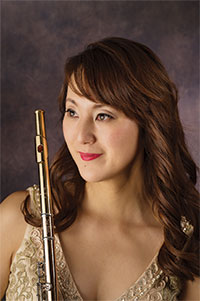As the summer approaches, many flutists choose to spend some time improving their playing both musically and technically. The March issue offered a listing of summer flute experiences for players of all levels. Five professional flutists from across the country share how they spent their summers while they were students developing their skills. Hopefully this inspires you to think big and explore some new experiences this summer.
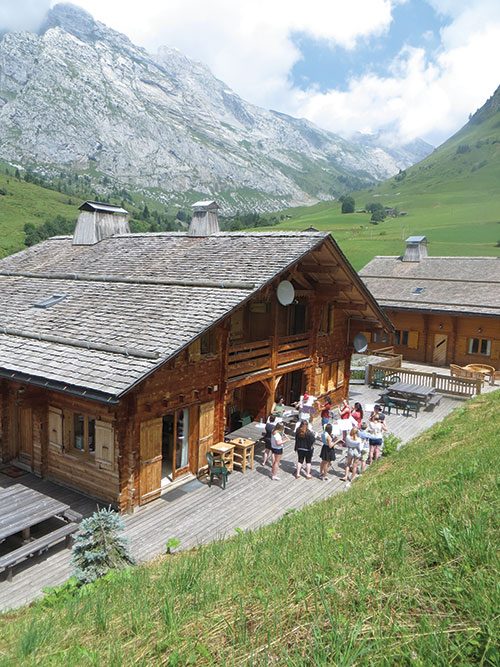
Photo courtesy of Flutes du Soleil
Wendy Rolfe: Summers while still a student ranged from the lows of working on an assembly line on a factory floor to the highs of performing at the Tanglewood Music Festival. My experiences all taught me a lot about music and life. No matter what I did, I kept my eyes and ears on the necessity of practicing and learning.
One of the most memorable summers I had was when I studied with Marcel Moyse. After my first year as a flute performance major at Oberlin Conservatory, I worked as a receptionist at the Marlboro Music Festival in Vermont and took private lessons with Moyse. I practiced at every opportunity, in breaks, and in the evenings. With Moyse, I worked on seeing what he called the skeleton, or the melodic structure, of the music, on its architecture, and on expression. I still refer to what he said about the Gabriel Fauré Fantaisie (shapes under the larger slurs, images of falling leaves), the Bach B minor Sonata (strong/weak – “je t’aime”), and more, in lessons with my students. At the end of the summer, he invited me to come to live there in Vermont and to study intensively with him. I decided to return to Oberlin to work with Robert Willoughby, who was returning from a sabbatical year. It was the right decision, but I sometimes wonder about the road not taken.
Another unforgettable summer during my Oberlin years was spent in England, where my dear friend and Oberlin classmate, flutist Greer Ellison Wolfson, and I lived with my aunt and uncle on the south coast. We commuted up to London weekly to study. My lessons were with the late Douglas Whittaker, former principal flutist with the BBC Symphony Orchestra, and Greer’s were with Peter Lloyd. We also trudged up to work at a local bakery factory every morning to earn a few pounds sterling to support our flute habits. I was on the assembly line, folding and loading pastries from a conveyor belt onto heavy iron trays, ready for baking. Greer labored at the end of the process, packing the baked sausage rolls into boxes ready for shipping. Apart from coming away from the summer with a strong commitment to the importance of labor unions, and equal pay for women (men were automatically paid more than women were), I did learn a lot in my flute lessons. After work, we swam in the chilly British seas and practiced at night. Mr. Whittaker spent a lot of time on Moyse’s L’Art de la Sonorité, and we also focused on contemporary repertoire, which was already one of my great interests.
With these summers and others when I had to find jobs to pay college and living costs, I came away with the knowledge that no matter how exhausted I was, I could still find the energy to practice after a day’s work. It was not easy to summon the reserves necessary for the intense concentration needed, but I tried to keep my long-term goals in mind. I knew that in order to come back to school in the fall as a better player, I had to do the daily practice all through the summer.
I spent another summer as a Fellow at the Tanglewood Music Center, the summer institute run by the Boston Symphony Orchestra in Lenox, Massachusetts. This was an amazing experience, and I learned a lot about conducting, while playing under then BSO Music Director Seiji Ozawa (principal flute in Stravinsky’s Le Sacre du Printemps) and watching him coach aspiring young conductors. What a thrill to perform with Leonard Bernstein, Klaus Tennstedt, Gunther Schuller, and more. Observing all of their work with the Conducting Fellows helped me to absorb skills which I use when leading ensembles today. I was fortunate to work on Arnold Schönberg’s Wind Quintet with Schuller and remember him focusing on exact dynamics, voicings, and balance. With the BSO’s former principal flutist Doriot Anthony Dwyer, we rehearsed intensively for a performance of Debussy’s Sonata for Flute, Viola and Harp, exploring colors and phrasing. In our flute section coachings with Dwyer, I remember her stressing that when playing second flute, one should use less vibrato than the principal flutist, and that has stood me in good stead.
The following summer was spent at the Waterloo Music Festival in New Jersey (now defunct, sadly). We got to perform great repertoire, including The Rite of Spring again (this time on alto flute) with Gerard Schwarz. I enjoyed working with Karl Kraber and also met a wonderful harpsichordist with whom I played concerts on Baroque flute for many years.
In sum, I learned that it is important to try and try again. The first time I auditioned for Tanglewood, I was not accepted. At that festival, I also learned the importance of consistent warm-ups – we were so busy that I did not always do them, and by the end of the summer, I could feel their lack. In the non-festival summers, I learned valuable life lessons, and had opportunities to study with outstanding teachers. Those also included studying with Lois Schaefer, former piccolo in the Boston Symphony Orchestra. In high school, I was also fortunate to participate in Jean-Pierre Rampal’s summer classes in Nice, France, and to play orchestral and chamber music at Red Fox Music Camp. So, flutists of all levels should look for summer programs that will stretch their skills and where they can work with fellow flutists and outstanding teachers. If this does not work out, remember to focus on long-term goals and keep on practicing and learning, no matter how challenging your schedule may be.
Wendy Rolfe is a Professor at Berklee College of Music. This summer, she will be an Artist/Clinician at the Flute Project 2018 in the Dominican Republic, the International Flute Festival in Quito, Ecuador, and the Santa Fe Flute Immersion, and will also teach at Berklee.
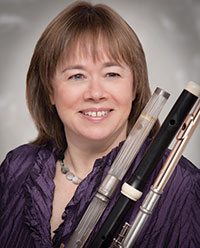
Sergio Pallottelli: When I was a student, I always looked forward to summers as this was a time for me to meet flute teachers from places other than my home town. I spent most of the year planning which festival or summer course to attend. The most memorable times were three summers spent at Nice Academy in France, studying with the great flute legend Maxence Larrieu. He taught about precision, style and was so picky that it brought my whole way of thinking to another level and helped me understand what kind of work I really needed to do to move forward.
He would make us repeat passages of three or four notes, all day, until they were correct. He would play a cadenza and expect us to replicate it by ear on the spot. Larrieu taught pieces that he knew and was always a bit reluctant to hear music he was not familiar with. He had very high expectations all the time but was such a gentle soul and approached everything with a great sense of humor. After class dinners were always planned. The value of being able to sit with the master and hear his stories about Rampal, Marion and other legends was unequaled.
I will never forget those summers as they shaped me as a musician and as a person. I will never be able to play certain pieces, Mozart concertos, Prokofiev sonata, Bach sonatas, without hearing Larrieu’s voice yelling something about the rhythm, the music, or the intonation. He taught us how to think deeply about every single note and relate it to life, so that a real story is always told as we play. He brought individuality to our interpretations and showed us that being opinionated is just a high level of caring about something.
Attending summer festivals is something I encourage my students to do now more than ever. It is a way to learn different styles of playing, experience different ways of teaching, and mostly, meet peers from different places in the world. This cultural and human exchange can only make them smarter and more sensitive and well-rounded musicians and teachers.
Sergio Pallottelli performs world-wide as a soloist and chamber musician and teaches as Professor of Flute at Longy School of Music of Bard College in Boston. In the summers he directs Flauti al Castello, a ten-day flute seminar in Tuscany and is faculty at the summer Zodiac Chamber Music Festival in South of France.
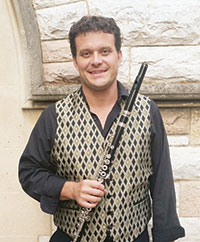
Teresa Muir: I participated in the National High School Music Institute, affectionally known as the Cherubs Program, at North-western University the summer of 1977. As an incoming high school junior, I knew my career choice of music education was certain but had no idea where I wanted to study. The three-week program included daily band with John Paynter, group flute study with Walfrid Kujala, jazz improv class with Cliff Colnot, and three trips to Ravinia. We actually saw Beverly Sills perform La Traviata live from a Ravinia pavilion seat. It was an amazing music experience and helped me decide where I wanted to attend school.
Teresa Muir currently teaches flute in Geneva, Illinois and serves as Program Director for Fox Valley El Sistema. Originally from the Pittsburgh area, she graduated from Northwestern University and taught in the Yorkville and Batavia schools.
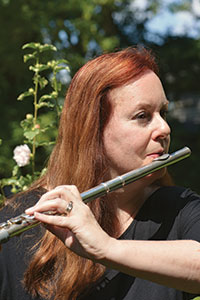
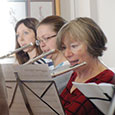
Mariana Gariazzo: As a flute student at the Universidad Nacional de Cuyo in Mendoza, Argentina, I was part of a very rigorous and competitive flute studio led by Mtro. Lars Nilsson. He was a foreigner in Argentina who had fallen in love with his new land, its music and people. So much in love, indeed, that Lars learned to play the quena – a traditional Andean flute – and achieved national acclaim as a member of Markama, a famous Andean music ensemble. Lars loves nature as much as he loves music, so he bought land in the central mountains of Argentina and built a house and musical retreat with his own hands. He called this magical place Nueva Vermland, referencing his native Vermland in Sweden. To date, there is no road leading to the house nor does it have electricity. The final stretch to the property can only be accomplished by foot, but what awaits on the mountain is pure bliss with nature.
Every summer, he would host a flute music camp called “Encuentros con la flauta y la naturaleza” (roughly translated to “Flute Meets Nature Summer Music Camp”). This week-long event brought flutists from all around the country as well as some daring flutists who came from Chile, Peru, and other nearby countries. The summer course consisted of a series of masterclasses, workshops, and chamber music sessions interwoven with just as important activities such as extensive and compelling hiking adventures, long walks along stunning creeks, and meals prepared by us and shared as a community. There were also chamber music concerts offered under the candle lights for the people who lived around the mountain who arrived at the house by horse or foot. The experience invigorated us for the entire year and connected us with a community of like-minded, flute-spirited, music-loving people as well as with nature and gave meaning to all we do.
Mariana Gariazzo is an Instructional Assistant Professor and long-distance educator at Texas A&M University, holds a MM from Yale University and a DMA from the University of Texas at Austin. She is a clinician, educator, and adjudicator. Her research focuses on new music and Latin America. As an advocate for low flutes, Gariazzo actively collaborates with composers in commissioning, recording and performing new music for C flute, alto and bass flutes.
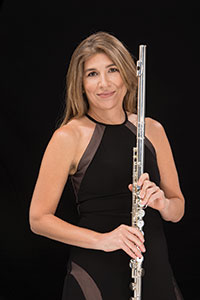
Hideko Amano: When I was a student of Paula Robison at the New England Conservatory in the 1990s, I attended a four-week seminar in the summer break in Nice, France where I studied with Alain Marion, Raymond Guiot, Marzio Conti, and Christian Larde. This was an adventure for me to travel and live in France by myself. I met many great flutists from all over the world, and it was an eye-opening experience. The teaching was phenomenal. At that time Marion and Guiot were the two teachers at the Paris Conservatory. Their teaching complemented one another. One emphasized artistic musicality and the other learning techniques. Marion always spoke about musicality referencing imagination and singing quality.
He was energetic and passionate about each student’s playing. He taught us to bring out our emotions through the music. There was never a dull moment in his music creation. He spoke some English. The first time I played for him, he tilted his head and asked, “Are you Japanese?” I said, “Yes.” This puzzled him until he figured out that I had grown up in America and of course was using an American vibrato. From that moment on, he nicknamed me “japonais americanne.”
Guiot emphasized finger technique and articulation. He used Marcel Moyse’s Gammes et Arpèges. The class was serious business and allowed me to compare myself with the top-notch international students. Marzio Conti, an Italian flutist and a conductor, was a pupil of Marion and also emphasized musicianship. He spoke English well and helped me develop artistry with his energy and passion for music. Christian Larde, a master flute teacher, was more like a Zen master. He was not as energetic as Marion or Conti, but his teaching was straight to the point and the things he wanted fixed were completely resolved with just a few words.
I feel very fortunate to have had these experiences. In America, we tend to emphasize orchestral performance, but studying in France focused on making me an artistic and musical flutist. I truly believe studying abroad is beneficial to students not only musically, but for their personal development.
Hideko Amano is a recitalist and teaches at Carthage College (WI), Harper College (IL), and Midwest Young Artists besides her private studio. Previously she taught at DePaul University. She is a graduate of the New England Conservatory (Paula Robison) and studied in Paris with Berlin Philharmonic flutist Mathieu Dufour.
